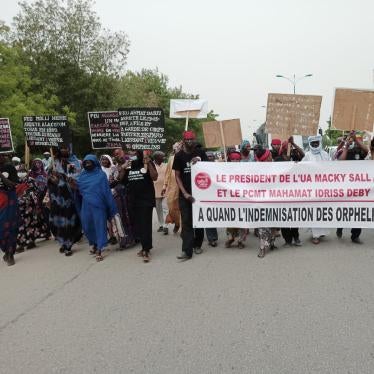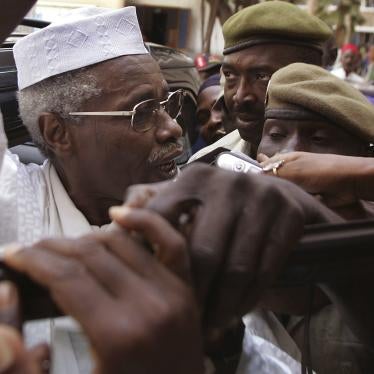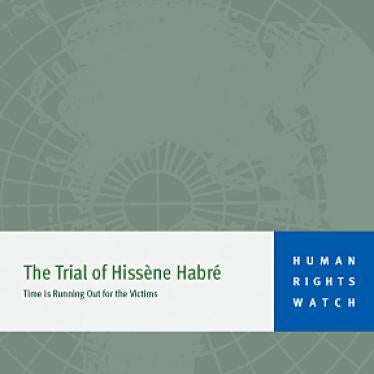(Addis Ababa) - Senegal should accept an African Union Commission plan for Senegal to try Hissène Habré before a special court with Senegalese and African judges, human rights groups said today.
The plan will be at the center of discussions at the African Union summit in Addis Ababa beginning January 30, 2011. It was drawn up in response to a decision by a West African regional court that Senegal must try Habré before a special court.
"The African Union has proposed an excellent plan to try Hissene Habre," said Jacqueline Moudeina, president of the Chadian Association for the Promotion and Defense of Human Rights. "If Senegal really wants justice to be done, at long last, it should accept the AU plan."
Habré is accused of thousands of political killings and systematic torture when he ruled Chad, from 1982 to 1990, before fleeing to Senegal.
Under the AU plan, presented on January 12 to President Abdoulaye Wade of Senegal by the AU peace and security commissioner, Amb. Ramtane Lamamra, an Extraordinary African Chambers would be created within the Senegalese justice system with the presidents of the trial court and the appeals court appointed by the African Union. The court would prosecute the person or persons "who bear the greatest responsibility" for genocide, crimes against humanity, war crimes and torture committed in Chad from June 1982 to December 1990 .
On November 18, 2010, the Court of Justice of the Economic Community of West African States (ECOWAS) said that Habré's trial should be carried out by "a special ad hoc procedure of an international character"
One week later, on November 24, international donors met in Dakar and fully funded the $11.7 million budget for the trial. Senegal's justice minister said that the donors' meeting was the "completion of the long process of preparation leading up to the actual start of trial" and that Senegal would discuss with the AU how to respond to the ECOWAS decision.
President Wade then backtracked on December 10 and invoked the ECOWAS decision in announcing that he had "had enough" of the Habré case and was "returning" it to the African Union.
On January 12, 2011, in response President Wade's statement, the United Nations Committee against Torture wrote to Senegal to remind it of its "obligation" to prosecute Habré or to extradite him to Belgium, which requested him for trial in 2005. (see CAT's letter here)
In a communiqué on January 19, President Wade said that Habré should be tried in Africa, and evoked the possibility of sending Habré back to Chad for trial. Chad's president, Idriss Déby, has said on several recent occasions that he was ready to hold the trial in Chad. The human rights groups expressed concern that Habré would not get a fair trial in Chad and worry that he could be mistreated or subject to the death penalty. A Chadian court in August 2008 sentenced Habré to death, in absentia, for his alleged participation in a rebellion to overthrow President Déby.
"There is no way Habré could get a fair trial in Chad," said Dobian Assingar, honorary president of the Chadian League for Human Rights and representative of the International Federation of Human Rights (FIDH). "The courts in Chad are under the thumb of the executive."
"Senegal's credibility in the fight against impunity is on the line in the Habré case. It can't both challenge the prosecution of abusive African leaders by international courts and fail to fulfil its own international obligations" said Alioune Tine, President of the African Assembly for the Defense of Human Rights (RADDHO).
The groups - Human Rights Watch, FIDH, ATPDH, RADDHO - said that they still believed that Habré's extradition to face trial in Belgium would be the most efficient and timely option for ensuring that he is able to respond to the charges against him with all the guarantees of a fair trial.
Habre was first indicted in Senegal in 2000, before Senegalese courts ruled that he could not be tried there. His victims then turned to Belgium and, after a four-year investigation, a Belgian judge in September 2005 issued an international arrest warrant charging Habré with crimes against humanity, war crimes and torture and requested his extradition.
Senegal then asked the African Union to recommend a course of action. On July 2, 2006, the African Union called on Senegal to prosecute Habré "on behalf of Africa," and President Abdoulaye Wade declared that Senegal would do so. He had refused to proceed for several years, however, until Senegal was provided with money to finance the trial.







